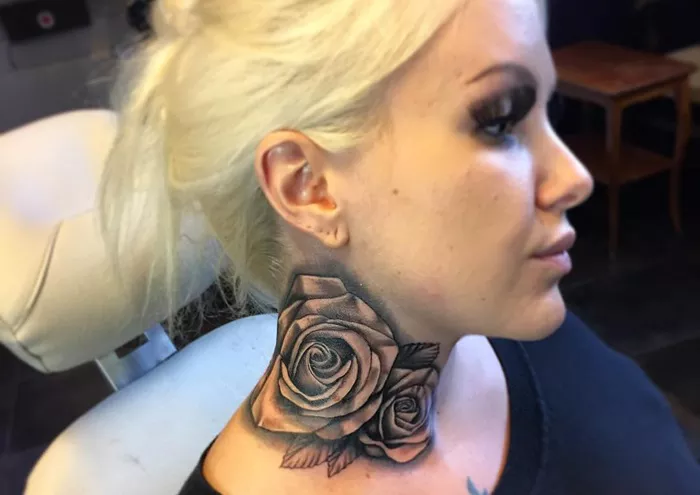Alitia Thoburn, a 20-year-old tattoo artist from Bristol, has become the center of online and offline criticism for her bold decision to get a large tattoo on the right side of her face. Despite the negative reactions, including comments from strangers saying she has “ruined her face,” Alitia stands by her tattoo, which she describes as one of her favorites.
The tattoo, a bold brush-like stroke of ink that stretches down her face and connects with a larger design on her collarbone, was done impulsively while she was getting inked by her fiancé, Jonathan Saunders, also a tattoo artist. While Alitia had been considering a facial tattoo for some time, it wasn’t until May 2023 that she took the plunge and got her first face tattoo, a decision she has no regrets about.
Alitia’s face tattoo has drawn harsh criticism, including one incident where an elderly woman questioned, “What the f*** have you done to your face?” and others calling her a “stupid b***h.” Despite these reactions, Alitia remains unfazed, insisting that tattoos can be a form of self-expression, not just a mark of rebellion. “I don’t understand why people always thought that tattoos meant you are a thug or criminal,” she said. “It could be something positive like a memorial or something you simply enjoy.”
The criticism has not stopped Alitia from embracing her tattoo journey. She has added flowers to her face tattoo to make it feel more feminine, and she plans to eventually cover her entire body in tattoos. Her goal is to create one massive design, connecting all her ink into a unified “body suit.”
Alitia’s determination to continue with her tattoo journey is a testament to her confidence in her choices, regardless of the judgment she faces. “The people who think I will regret my tattoos let them, I don’t care what they think,” she says.
Despite the negativity, Alitia has received plenty of support from those who admire the design, with many people telling her it suits her unique style. She believes that tattoos are an essential part of customizing her appearance, and that every choice she’s made in life has contributed to shaping who she is. “I don’t regret anything in life because if I did things differently I wouldn’t be the same person,” she adds.
Alitia’s story highlights a broader cultural divide in attitudes toward visible tattoos. A YouGov study found that 26% of the British public have tattoos, with 11% sporting visible ones. However, visible tattoos on the face and neck remain highly controversial, with 63% of people considering them unprofessional in the workplace. Despite these challenges, attitudes toward tattoos seem to be evolving. For instance, in 2019, Air New Zealand lifted its ban on body art, allowing employees to express their individuality and cultural heritage.
Though Alitia’s face tattoo may not be fully accepted for years to come, she is resolute in her decision. “I like to customise how I look,” she says, embodying the growing trend of people using tattoos as a form of personal and artistic expression, even in the face of adversity.
Related topics:

